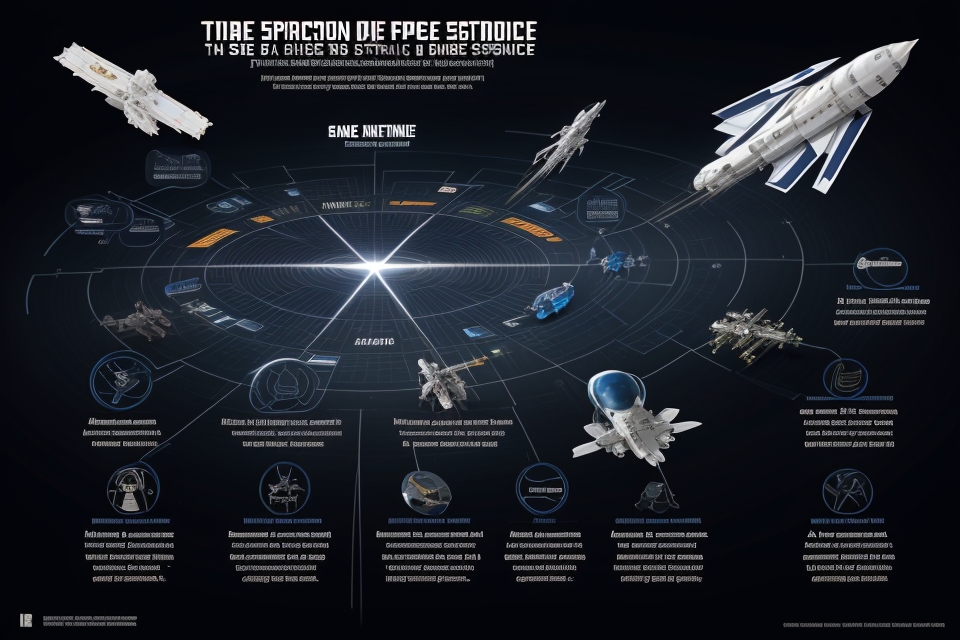
Are you curious about the pay structure of the Space Force? As the newest branch of the military, the Space Force has generated a lot of interest and speculation about what it takes to join this elite group of space warriors. In this comprehensive guide, we’ll take a deep dive into the salaries and benefits of those who serve in the Space Force, from enlisted personnel to officers. So, if you’re ready to learn more about the financial rewards of defending our nation in the final frontier, buckle up and let’s launch into the world of Space Force pay!
Understanding the Basics of Space Force Pay
How is Pay Determined in the Space Force?
The pay structure of the Space Force is determined by a variety of factors, including the role and responsibilities of the individual, their rank, and their level of experience. In this section, we will explore these factors in more detail.
Factors that influence pay in the Space Force
- Role and Responsibilities: The Space Force offers a range of roles and responsibilities, each with its own level of pay. For example, those in leadership positions, such as commanders or colonels, may receive higher pay than those in more specialized roles.
- Rank: The Space Force operates a rank structure similar to other military branches, with higher ranks receiving higher pay. This structure is designed to reflect the increased responsibility and leadership that comes with each new rank.
- Experience: The amount of experience an individual has in their role can also influence their pay. Those with more experience may receive higher pay than those who are newer to their role.
The role of rank and experience in determining pay
- Rank: As mentioned above, rank plays a significant role in determining pay in the Space Force. As individuals progress through the ranks, their pay will increase accordingly.
- Experience: Experience is also a key factor in determining pay. Those who have been in their role for a longer period of time may receive higher pay than those who are newer to their role. This is because experienced individuals have demonstrated their ability to perform their role effectively and have a deeper understanding of the responsibilities and challenges associated with their position.
In conclusion, the pay structure of the Space Force is determined by a range of factors, including role and responsibilities, rank, and experience. Understanding these factors is crucial for those looking to join the Space Force, as it can help them understand what to expect in terms of pay and progression within the organization.
What is the Pay Scale for Space Force Personnel?
When it comes to pay scales for Space Force personnel, there are several factors to consider. These include the rank of the individual, their job role, and their years of service. It is important to note that the pay scale for Space Force personnel is different from that of other military branches, so it is essential to understand the specifics of the Space Force pay structure.
Overview of the Pay Scale for Enlisted Personnel, Officers, and Pilots
Enlisted personnel in the Space Force can expect to earn a base pay that is determined by their rank and years of service. This pay is adjusted annually for inflation and is designed to reflect the individual’s level of responsibility and experience. In addition to base pay, enlisted personnel may also be eligible for bonuses and other incentives based on their job performance and other factors.
Officers in the Space Force are typically paid a higher base pay than enlisted personnel, with the amount determined by their rank and years of service. Like enlisted personnel, officers may also be eligible for bonuses and other incentives based on their job performance and other factors.
Pilots in the Space Force are typically considered officers and are paid accordingly. However, the pay scale for pilots may differ from that of other officers due to the specialized training and responsibilities associated with this role.
Comparing Space Force Pay to Other Military Branches
When comparing the pay structure of the Space Force to that of other military branches, it is important to consider several factors. These include the level of responsibility and experience required for each role, as well as the unique challenges and demands associated with each branch.
Overall, the pay structure of the Space Force is designed to reflect the unique nature of this branch and the challenges and demands associated with its mission. By understanding the basics of Space Force pay, individuals can make informed decisions about their career path and compensation within this branch.
Navigating the Complexities of Space Force Pay
Allowances and Benefits
When it comes to the pay structure of the Space Force, it’s not just about the base salary. There are several allowances and benefits that come with serving in this branch of the military. In this section, we will explore these allowances and benefits in detail.
Housing Allowance
One of the primary allowances that members of the Space Force receive is a housing allowance. This allowance is designed to help cover the costs of housing and utilities for service members and their families. The amount of the housing allowance varies depending on the location of the duty station, with more expensive locations receiving higher allowances.
Food Allowance
Another allowance that members of the Space Force receive is a food allowance. This allowance is designed to help cover the costs of meals and groceries for service members and their families. The amount of the food allowance varies depending on the location of the duty station, with more expensive locations receiving higher allowances.
Travel Allowance
Members of the Space Force may also receive a travel allowance to help cover the costs of travel related to their service. This allowance may include costs such as transportation, lodging, and meals while on travel orders. The amount of the travel allowance varies depending on the location of the duty station and the purpose of the travel.
Other Benefits of Serving in the Space Force
In addition to the allowances mentioned above, there are several other benefits to serving in the Space Force. These benefits may include access to healthcare, dental care, and vision care, as well as access to educational opportunities and career development programs. Service members may also be eligible for a variety of additional benefits, such as life insurance, retirement benefits, and disability benefits.
Overall, the allowances and benefits of serving in the Space Force can provide significant financial support for service members and their families. However, it’s important to note that these allowances and benefits are subject to change and may vary depending on a variety of factors, including the location of the duty station and the length of service.
Incentive Programs and Bonuses
In addition to the standard pay structure, the Space Force offers various incentive programs and bonuses to reward and retain its personnel. These programs aim to motivate individuals to excel in their roles and contribute to the overall success of the organization. Understanding the relevant programs and their criteria for eligibility and qualification is essential for Space Force personnel to make informed decisions about their career progression.
Some of the key incentive programs and bonuses offered by the Space Force include:
- Performance-Based Bonuses: These bonuses are awarded to individuals who consistently demonstrate exceptional performance in their roles. The criteria for eligibility typically include meeting or exceeding specific performance metrics, receiving commendations from superiors, and contributing to the achievement of organizational goals.
- Education and Training Incentives: The Space Force encourages continuous learning and professional development by offering incentives for pursuing education and training opportunities. This may include tuition reimbursement, certification reimbursement, and other forms of support for individuals seeking to enhance their skills and knowledge.
- Hardship Duty Pay: For personnel assigned to high-stress or challenging environments, the Space Force provides additional compensation in the form of hardship duty pay. This payment is intended to recognize the unique demands and risks associated with such assignments and help retain talented individuals in these critical roles.
- Leadership Development Programs: The Space Force offers various leadership development programs aimed at cultivating future leaders within the organization. These programs often include mentoring, coaching, and training opportunities, as well as opportunities for increased responsibility and visibility within the organization.
- Reenlistment Bonuses: To encourage retention of skilled personnel, the Space Force offers reenlistment bonuses to individuals who choose to continue their service. The amount of the bonus varies depending on factors such as rank, job specialty, and years of service.
It is important to note that eligibility criteria for these incentive programs and bonuses may vary depending on individual circumstances and organizational needs. It is recommended that Space Force personnel consult with their supervisors or human resources representatives to determine the specific programs and criteria applicable to their situations.
Career Advancement and Promotions
In the Space Force, career advancement and promotions play a significant role in determining an individual’s pay. As personnel progress through their careers, they may be eligible for promotions that come with increased responsibilities and, consequently, higher pay. It is essential for Space Force personnel to understand how pay is affected by career advancement and promotions and to engage in professional development and career planning to maximize their earning potential.
How Pay is Affected by Career Advancement and Promotions
In the Space Force, pay is typically determined by a combination of factors, including job title, rank, and experience. As personnel advance through the ranks, they may be eligible for promotions that come with increased pay. For example, a promotion from the rank of Captain to Major may result in a significant increase in pay.
In addition to promotions, personnel may also see their pay increase as they gain experience in their current role. This is because the Space Force recognizes that personnel who have been in their positions for longer periods of time have developed a greater level of expertise and are more valuable to the organization.
Importance of Professional Development and Career Planning
Given the role that career advancement and promotions play in determining pay in the Space Force, it is essential for personnel to engage in professional development and career planning. This may involve seeking out opportunities for training and education, networking with other professionals in the field, and identifying areas for growth and development.
By investing in their professional development, Space Force personnel can position themselves for promotions and other opportunities that may come with increased pay and responsibility. Additionally, by taking a proactive approach to their careers, personnel can ensure that they are maximizing their earning potential and achieving their long-term career goals.
Special Considerations for Space Force Pay
Space Force Uniform Testing
How uniform testing affects pay
The Space Force uniform testing process is a critical aspect of ensuring that its personnel are well-equipped to carry out their duties effectively. Uniform testing involves evaluating the functionality, durability, and performance of the uniforms and related gear used by Space Force personnel. The results of this testing have a direct impact on the pay structure of the Space Force.
Uniform testing requirements and procedures
The Space Force has established rigorous testing requirements and procedures to ensure that its uniforms and gear meet the highest standards of performance and safety. These tests are conducted in a variety of environments, including simulated space missions, to assess the functionality and durability of the uniforms and gear.
The testing process includes a range of factors, such as thermal protection, radiation shielding, and mobility, to ensure that the uniforms and gear are suitable for the specific missions and conditions that Space Force personnel may encounter. The results of these tests are used to inform the design and production of new uniforms and gear, as well as to make adjustments to the existing inventory.
The Space Force also has a comprehensive maintenance and replacement program in place to ensure that its uniforms and gear remain in good condition and are available to personnel when needed. This program is an important aspect of the overall pay structure of the Space Force, as it helps to ensure that personnel have access to the best possible equipment to carry out their duties effectively.
Pay Differences between Active Duty and Reserve Personnel
The Space Force, like other military branches, has distinct pay structures for its active duty and reserve personnel. It is important to understand these differences as they can significantly impact a service member’s financial situation.
Differences in pay between active duty and reserve personnel
Active duty personnel are full-time members of the Space Force who are committed to serving on a permanent basis. They receive a monthly basic pay based on their rank and years of service. In addition to basic pay, active duty personnel may also receive various allowances and bonuses based on their assignment and circumstances.
Reserve personnel, on the other hand, are part-time members of the Space Force who serve on a part-time basis and are not committed to a permanent career in the military. They receive a monthly drill pay based on their rank and years of service, as well as an annual training pay for the time they spend participating in training exercises.
Factors that influence pay for reserve personnel
The pay for reserve personnel is influenced by several factors, including their rank, years of service, and the type of reserve duty they are serving. For example, reserve personnel who are serving on active duty or who are called to active duty may receive a higher pay rate than those who are not.
Additionally, reserve personnel who have special skills or qualifications may receive additional pay, known as special pay. This can include pay for language skills, medical skills, or other specialized training.
Overall, understanding the differences in pay between active duty and reserve personnel is crucial for service members to make informed decisions about their career paths and financial situations.
Space Force vs. Civilian Jobs
When comparing Space Force pay to civilian jobs in the same field, it is important to consider the unique nature of service in the military. The Space Force is a relatively new branch of the military, having only been established in 2019. As such, there may be some differences in pay and benefits compared to other branches of the military or to civilian jobs in the same field.
One key difference between Space Force pay and civilian jobs is the opportunity for career growth and advancement. While some civilian jobs may offer higher starting salaries, the Space Force offers a clear path for career progression and advancement through the ranks. In addition, the Space Force offers a unique opportunity to serve the country and protect national security interests in space.
It is also important to consider the benefits package that comes with Space Force pay. In addition to base pay, Space Force members may be eligible for a variety of benefits, including health care, housing allowances, and retirement benefits. These benefits can help to offset the difference in pay between Space Force jobs and civilian jobs in the same field.
Ultimately, the decision to join the Space Force or to pursue a civilian job in the same field will depend on a variety of factors, including personal goals, career aspirations, and financial considerations. By understanding the differences between Space Force pay and civilian pay, individuals can make informed decisions about their career paths and financial futures.
FAQs
1. How much do you get paid in the Space Force?
The pay structure of the Space Force is based on the rank and experience of the individual. Enlisted personnel in the Space Force can earn anywhere from $20,000 to $70,000 per year, while officers can earn up to $120,000 per year. Pay increases with each promotion and the amount of time served in the military.
2. Are there any additional benefits or bonuses for serving in the Space Force?
Yes, there are several benefits and bonuses available to those who serve in the Space Force. These include healthcare, housing allowances, and educational opportunities. Additionally, those who serve in the Space Force may be eligible for bonuses based on their performance and the needs of the military.
3. Can you negotiate your pay in the Space Force?
The pay structure of the Space Force is determined by rank and experience, and is not negotiable. However, there are opportunities for advancement and increased pay through promotions and bonuses.
4. Is it worth it to join the Space Force for the pay?
Joining the Space Force is a serious commitment, and the decision to join should not be based solely on pay. However, the pay structure of the Space Force is competitive with other branches of the military, and there are several benefits and opportunities available to those who serve. Ultimately, the decision to join the Space Force should be based on a person’s interests and desire to serve their country.


